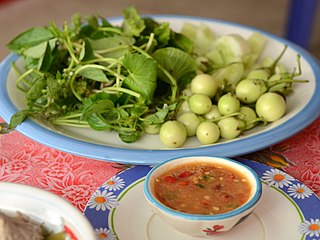Related Research Articles

Tempoyak, asam durian or pekasam is a Malay condiment made from fermented durian. It is usually consumed by the ethnic Malays in Maritime Southeast Asia, notably in Indonesia and Malaysia. Tempoyak is made by taking the flesh of durian and mixing it with some salt and kept in room temperature for three or five days for fermentation. Tempoyaks are usually made during the durian season, when the abundance of durian and excess production are made into fermented tempoyak.

Shrimp paste or prawn sauce is a fermented condiment commonly used in Southeast Asian and Southern Chinese cuisines. It is primarily made from finely crushed shrimp or krill mixed with salt, and then fermented for several weeks. They are either sold in their wet form or are sun-dried and either cut into rectangular blocks or sold in bulk. It is an essential ingredient in many curries, sauces and sambal. Shrimp paste can be found in many meals in Cambodia, Indonesia, Laos, Malaysia, Myanmar, the Philippines, Singapore, Thailand, and Vietnam. It is often an ingredient in dip for fish or vegetables.

Acetes is a genus of small shrimp that resemble krill, which is native to the western and central Indo-Pacific, the Atlantic coast of the Americas, Pacific coast of South America and inland waters of South America. Although most are from marine or estuarine habitats, the South American A. paraguayensis is a fresh water species. Several of its species are important for the production of shrimp paste in Southeast Asia, including A. japonicus, which is the world's most heavily fished species of wild shrimp or prawn in terms of total tonnage.

Nam phrik is a type of Thai spicy chili sauce typical of Thai cuisine. Usual ingredients for nam phrik type sauces are fresh or dry chilies, garlic, shallots, lime juice and often some kind of fish or shrimp paste. In the traditional way of preparing these sauces, the ingredients are pounded together using a mortar and pestle, with either salt or fish sauce added to taste.
Bagoong fried rice, also known as binagoongan fried rice or anglicized as shrimp paste fried rice, is a Filipino fried rice dish cooked by stir-frying pre-cooked rice with sauteed bagoong alamang, toasted garlic, spring onions, shallots, julienned sour green mangoes, and optionally other ingredients like chilis, cucumbers, jicamas, carrots, scrambled eggs, chicharon, and tomatoes. It is usually light pink in color due to the use of angkak coloring agent from the bagoong. It is eaten paired with meat and seafood dishes, or is cooked with chunks of meat and seafood and eaten as is.
Lentibacillus saliphilus is a moderately halophilic bacterium from the genus of Lentibacillus.
Lentibacillus alimentarius is a Gram-positive, endospore-forming and rod-shaped bacterium from the genus of Lentibacillus which has been isolated from the food Myeolchi-jeotgal.
Lentibacillus amyloliquefaciens is a Gram-positive, non-spore-forming, aerobic, rod-shaped and halophilic bacterium from the genus of Lentibacillus which has been isolated from saline sediments from the Yantai City.
Lentibacillus cibarius is a Gram-positive, aerobic, spore-forming, halophilic, rod-shaped and non-motile bacterium from the genus of Lentibacillus which has been isolated from Kimchi.
Lentibacillus garicola is a Gram-positive, aerobic and moderately halophilic bacterium from the genus of Lentibacillus which has been isolated from Myeolchi-aekjeot.
Lentibacillus halodurans is a Gram-positive, moderately halophilic, rod-shaped and spore-forming bacterium from the genus of Lentibacillus which has been isolated from sediments from a neutral salt lake in Xin-Jiang.
Lentibacillus jeotgali is a Gram-positive, endospore-forming, moderately halophilic and non-motile bacterium from the genus of Lentibacillus which has been isolated from fermented seafood.
Lentibacillus kapialis is a Gram-positive, strictly aerobic and moderately halophilic bacterium from the genus of Lentibacillus which has been isolated from fermented shrimp paste from Thailand.
Lentibacillus lacisalsi is a spore-forming, aerobic and moderately halophilic bacterium from the genus of Lentibacillus which has been isolated from a salt lake in China.
Lentibacillus lipolyticus is a Gram-positive, aerobic, spore-forming and moderately halophilic bacterium from the genus of Lentibacillus which has been isolated from shrimp paste from the Samut Sakhon province.
Lentibacillus persicus is a Gram-positive, endospore-forming, moderately halophilic and facultatively anaerobic bacterium from the genus of Lentibacillus which has been isolated from water from the lake Aran-Bidgol in Iran.
Lentibacillus salarius is a Gram-positive, spore-forming and moderately halophilic bacterium from the genus of Lentibacillus which has been isolated from saline sedimens from the Xinjiang Province.
Lentibacillus salinarum is a Gram-positive, rod-shaped, moderately halophilic and motile bacterium from the genus of Lentibacillus wich has been isolated from a marine solar saltern in Korea.
Lentibacillus salis is a Gram-positive, aerobic, moderately halophilic, spore-forming and motile bacterium from the genus of Lentibacillus which has been isolated from a salt lake from the Xinjiang Province.
References
- 1 2 "Species: Lentibacillus panjinensis". LPSN.DSMZ.de.
- 1 2 Li, Kexin; Sang, Xue; Zhu, Yaolei; Zhang, Gongliang; Bi, Jingran; Hao, Hongshun; Hou, Hongman; Qian, Fang (September 2020). "Lentibacillus panjinensis sp. nov., Isolated from Shrimp Paste, a Traditional Chinese Fermented Seafood". Current Microbiology. 77 (9): 1997–2001. doi:10.1007/s00284-020-02122-z. PMID 32754853. S2CID 220966812.
- ↑ "Lentibacillus panjinensis". www.uniprot.org.